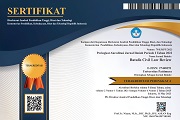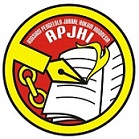Efektifitas Kebijakan Program Adiwiyata Dalam Mencetak Generasi Penerus Bangsa Peduli Lingkungan Di Indonesia
 )
)
(1) Fakultas Hukum Universitas Gadjah Mada, Yogyakarta, Indonesia
 Corresponding Author
Corresponding Author
Abstract
Adiwiyata Program is a program implemented by the State Ministry of Environment and Forestry to create schools that care and have an environmental culture. This program aims to save and preserve the environment for the benefit of future generations, followed by schools from elementary to secondary levels. Adiwiyata program is expected to produce students who are young generations to care for the environment. This research aims to examine the need to promote adiwiyata program policies in creating the next generation who cares about the environment throughout Indonesia; the effectiveness of Adiwiyata program policies in creating the nation's next generation; the need for a role from the Government related to Adiwiyata program policies in creating the next generation of the nation who cares about the environment in Indonesia. This research is a normative legal research. The research materials are taken from literature study. Qualitative descriptive approach is employed to analyse the materials. This research generates some results: 1) Adiwiyata program policies in creating the nation's next generation who care about the environment need to be encouraged in schools throughout Indonesia, because it is positive for the development of the nation's next generation in an effort to preserve environmental functions, to create a good and healthy living environment; 2) Adiwiyata program policy has been running effectively, although it has not been optimal in creating the nation's next generation; 3) The role of the Government is needed in relation to the Adiwiyata program policy in creating the next generation who cares about the environment in Indonesia, to provide environmental awareness for citizens
Keywords
DOI
10.47268/ballrev.v2i2.654
Published
2021-11-27
How To Cite
@article{BALLREV654,
author = {Dinarjati Puspitasari},
title = {Efektifitas Kebijakan Program Adiwiyata Dalam Mencetak Generasi Penerus Bangsa Peduli Lingkungan Di Indonesia},
journal = {Batulis Civil Law Review},
volume = {2},
number = {2},
year = {2021},
keywords = {Effectiveness of Adiwiyata Policy; The Next Generation; Environmental Care},
abstract = {Adiwiyata Program is a program implemented by the State Ministry of Environment and Forestry to create schools that care and have an environmental culture. This program aims to save and preserve the environment for the benefit of future generations, followed by schools from elementary to secondary levels. Adiwiyata program is expected to produce students who are young generations to care for the environment. This research aims to examine the need to promote adiwiyata program policies in creating the next generation who cares about the environment throughout Indonesia; the effectiveness of Adiwiyata program policies in creating the nation's next generation; the need for a role from the Government related to Adiwiyata program policies in creating the next generation of the nation who cares about the environment in Indonesia. This research is a normative legal research. The research materials are taken from literature study. Qualitative descriptive approach is employed to analyse the materials. This research generates some results: 1) Adiwiyata program policies in creating the nation's next generation who care about the environment need to be encouraged in schools throughout Indonesia, because it is positive for the development of the nation's next generation in an effort to preserve environmental functions, to create a good and healthy living environment; 2) Adiwiyata program policy has been running effectively, although it has not been optimal in creating the nation's next generation; 3) The role of the Government is needed in relation to the Adiwiyata program policy in creating the next generation who cares about the environment in Indonesia, to provide environmental awareness for citizens},
issn = {2746-8151}, pages = {109--125} doi = {10.47268/ballrev.v2i2.654},
url = {https://fhukum.unpatti.ac.id/jurnal/ballrev/article/view/654}
}
Algamar. (n.d.). Metode Evaluasi 2 Standar (Kegiatan Lingungan Berbasis Partisipatif Dan Pengelolaan Sarana Pendukung Ramah Lingkungan).
Desfandi, M., Maryani, E., & Disman. (2017). Implementasi Kebijakan Sekolah Berwawasan Lingkungan Sebagai Upaya Mengembangkan Literasi Ekologis Peserta Didik. SOSIO-DIDAKTIKA: Social Science Education Journal, 4(2), 30-38.
Fadli, M., Mukhlis, & Lutfi, M. (2016). Hukum Dan Kebijakan Lingkungan. UB Press.
Hadi, D. W. (2019). 434 Sekolah Raih Penghargaan Adiwiyata Tahun 2019. Biro Hubungan Masyarakat KLHK. https://ppid.menlhk.go.id/siaran_pers/browse/2254
Haris, E., Abas, H. M., & Wardiana, Y. (2018). Sekolah Adiwiyata, Panduan Implementasi Adiwiyata Mandiri Di Sekolah. Erlangga.
Herlinawati, M. (2018). 396 Sekolah Terima Penghargaan Lingkungan Adiwiyata. Antaranews.Com. https://www.antaranews.com/berita/780160/396-sekolah-terima-penghargaan-lingkungan-adiwiyata
Ibeng, P. (2019). Pengertian Adiwiyata, Tujuan, Fungsi, Kriteria, Dan Manfaatnya. Pendidikan.Co.Id. https://pendidikan.co.id/pengertian-adiwiyata/
Iswari, R. D., & Utomo, S. W. (2017). Evaluasi Penerapan Program Adiwiyata Untuk Membentuk Perilaku Peduli Lingkungan Di Kalangan Siswa (Kasus: SMA Negeri 9 Tangerang Selatan Dan MA Negeri 1 Serpong). Jurnal Ilmu Lingkungan, 15(1), 35-41.
https://doi.org/10.14710/jil.15.1.35-41
Laila, K. E. (2018). Sekolah Adiwiyata - Partisipatif Dan Berkelanjutan. Provisieducation.Com. ttps://www.provisieducation.com/from-the-field/sekolah-adiwiyata-partisipatif-dan-berkelanjutan
Muladi. (2009). Hak Asasi Manusia, Hakekat, Konsep, Dan Implikasinya Dalam Perspektif Hukum Dan Masyarakat. Refika Aditama.
Mutiara, N. (2019). SDN Serayu Berhasil Meraih Penghargaan Adiwiyata Mandiri. Lingkunganhidup.Jogjakota.Go.Id. https://lingkunganhidup.jogjakota.go.id/detail/index/257
Nurhayati, E., & Savira, S. I. (2015). Implementasi Kurikulum Berbasis Lingkungan di Sekolah Adiwiyata (Studi Kasus di SMP Negeri 16Surabaya). Inspirasi Manajemen Pendidikan, 2(2).
Rahmadi, T. (2019). Hukum Lingkungan di Indonesia. Rajawali Pers.
Rakhmawati, D. (2015). Model Pengembangan Karakter Peduli Lingkungan Siswa Sekolah Adiwiyata Mandiri: Studi Ksus Di Sekolah Menengah Kejuruan 2 Semarang. Universitas Negeri Semarang.
Silalahi, M. D., & Kristianto. (2015). Hukum Lingkungan Dalam Perkembangannya Di Indonesia. Keni Media.
Sod, M. (2019). Hukum Lingkungan Di Indonesia. Sinar Grafika.
Sudarwati, T. M. (2012). Implementasi Kebijakan Pendidikan Lingkungan Hidup Sekolah Menegah Atas Negeri 11 Semarang Menuju Sekolah Adiwiyata. Universitas Diponegoro.
Susilo, R. K. D. (2014). Sosiologi Lingkungan. Raja Grafindo Persada.
Tim Kajian Kerjasama ICEL dan IICT. (2005). Hak Atas Lingkungan Hidup (Sebuah Kajian Prinsip-Prinsip HAM Dalam Instrumen Nasional). Komisi Nasional Hak Asasi Manusia.
Tompodung, T. C. G., Rushayati, S. B., & Aidi, M. N. (2018). Efektifitas Program Adiwiyata Terhadap Perilaku Ramah Lingkungan Warga Sekolah Di Kota Depok. Jurnal Pengelolaan Sumberdaya Alam Dan Lingkungan (Journal of Natural Resources and Environmental Management), 8(2), 170-177. https://doi.org/10.29244/jpsl.8.2.170-177
https://doi.org/10.29244/jpsl.8.2.170-177
Uyun, S., Octavia, S. A., Muharom, A., & Hilaliah, L. (2020). Manajemen Sekolah/Madrasah Adiwiyata. Deepublish.
Violleta, P. T. (2019). KLHK Beri Penghargaan Adiwiyata Untuk Sekolah Peduli Lingkungan. Antaranews.Com. https://www.antaranews.com/berita/1207852/klhk-beri-penghargaan-adiwiyata-untuk-sekolah-peduli-lingkungan
Widyaningrum, L. (2019). Meningkatkan Budaya Sekolah Berwawasan Lingkungan Guna Menciptakan Sekolah Adiwiyata. Researchgate.Net. https://www.researchgate.net/publication/338237523_Meningkatkan_Budaya_Sekolah_Berwawasan_Lingkungan_Guna_Menciptakan_Sekolah_Adiwiyata
| Dublin Core | PKP Metadata Items | Metadata for this Document | |
| 1. | Title | Title of document | Efektifitas Kebijakan Program Adiwiyata Dalam Mencetak Generasi Penerus Bangsa Peduli Lingkungan Di Indonesia |
| 2. | Creator | Author's name, affiliation, country | Dinarjati Eka Puspitasari; Fakultas Hukum Universitas Gadjah Mada, Yogyakarta; Indonesia |
| 3. | Subject | Discipline(s) | |
| 3. | Subject | Keyword(s) | Effectiveness of Adiwiyata Policy; The Next Generation; Environmental Care |
| 4. | Description | Abstract | Adiwiyata Program is a program implemented by the State Ministry of Environment and Forestry to create schools that care and have an environmental culture. This program aims to save and preserve the environment for the benefit of future generations, followed by schools from elementary to secondary levels. Adiwiyata program is expected to produce students who are young generations to care for the environment. This research aims to examine the need to promote adiwiyata program policies in creating the next generation who cares about the environment throughout Indonesia; the effectiveness of Adiwiyata program policies in creating the nation's next generation; the need for a role from the Government related to Adiwiyata program policies in creating the next generation of the nation who cares about the environment in Indonesia. This research is a normative legal research. The research materials are taken from literature study. Qualitative descriptive approach is employed to analyse the materials. This research generates some results: 1) Adiwiyata program policies in creating the nation's next generation who care about the environment need to be encouraged in schools throughout Indonesia, because it is positive for the development of the nation's next generation in an effort to preserve environmental functions, to create a good and healthy living environment; 2) Adiwiyata program policy has been running effectively, although it has not been optimal in creating the nation's next generation; 3) The role of the Government is needed in relation to the Adiwiyata program policy in creating the next generation who cares about the environment in Indonesia, to provide environmental awareness for citizens |
| 5. | Publisher | Organizing agency, location | Faculty of Law, Universitas Pattimura |
| 6. | Contributor | Sponsor(s) | |
| 7. | Date | (YYYY-MM-DD) | 2021-11-27 |
| 8. | Type | Status & genre | Peer-reviewed Article |
| 8. | Type | Type | |
| 9. | Format | File format | |
| 10. | Identifier | Uniform Resource Identifier | https://fhukum.unpatti.ac.id/jurnal/ballrev/article/view/654 |
| 10. | Identifier | Digital Object Identifier | 10.47268/ballrev.v2i2.654 |
| 11. | Source | Title; vol., no. (year) | Batulis Civil Law Review; Vol 2, No 2 (2021): VOLUME 2 NOMOR 2, NOVEMBER 2021 |
| 12. | Language | English=en | en |
| 13. | Relation | Supp. Files | |
| 14. | Coverage | Geo-spatial location, chronological period, research sample (gender, age, etc.) | |
| 15. | Rights | Copyright and permissions | Copyright: Authors who publish their manuscripts in this Journal agree to the following conditions: 1. The copyright in each article belongs to the author, as well as the right to patent. 2. Authors are able to enter into separate, additional contractual arrangements for the non-exclusive distribution of the journal's published version of the work (e.g., post it to an institutional repository or publish it in a book), with an acknowledgment of its initial publication in this journal. 3. Authors are permitted and encouraged to post their work online (e.g., in institutional repositories or on their website) prior to and during the submission process, as it can lead to productive exchanges, as well as earlier and greater citation of published work. 4. Authors have the right to self-archiving of the article (Author Self-Archiving Policy)
Licence : Batulis Civil Law Review Journal is disseminated based on the Creative Commons Attribution-NonCommercial 4.0 International license terms. This license allows anyone to copy and redistribute this material in any form or format, compose, modify, and make derivatives of this material for any purpose. You cannot use this material for commercial purposes. You must specify an appropriate name, include a link to the license, and certify that any changes have been made. You can do this in a way that is appropriate, but does not imply that the licensor supports you or your use.
|
Copyright (c) 2021 Dinarjati Eka Puspitasari

This work is licensed under a Creative Commons Attribution-NonCommercial 4.0 International License.

 : 3462 times
: 3462 times Download : 1553 times
Download : 1553 times














